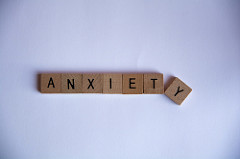As a college student, I hear the words “anxiety” and “stress” tossed around all the time. Phrases like, “This test is making me so anxious,” “My anxiety is through the roof,” or “I’m so stressed” can be heard daily on a college campus. What many people are not informed about, though, is that “stress” and “anxiety” are not interchangeable. So, here’s the breakdown.
Stress 
The Definition: According to the Merriam-Webster Dictionary, stress is “a state of mental tension or worry caused by problems in your life, work, etc.”
The Statistics: According to the American Psychological Association, “more than half of working adults-and 47 percent of all Americans-say they are concerned with the amount of stress in their lives.”
The Science: Stress is caused by a trigger that leads to a release of hormones like adrenaline and cortisol from your hypothalamus. These hormones are pretty short-lived, but they cause a variety of effects in the body, including increased heart rate and respiration, decreased digestion and salivation (you know when your mouth gets all dry during a speech?), and an increase in blood sugar. All of these effects are meant to prime you for a “fight-or-flight” situation, but can be triggered by day-to-day stressors like exams, personal conflicts, or things that go bump in the night. When people are constantly exposed to stressors, like long-term family problems or constant noises like traffic, their bodies might trigger the stress response all the time, which is called chronic stress.
Anxiety 
The Definition: Again according to the Merriam-Webster Dictionary, anxiety is, “painful or apprehensive uneasiness of mind usually over an impending or anticipated ill.”
The Statistics: According to the National Institute of Mental Health, “Anxiety disorders are the most common mental illness in the U.S., affecting 40 million adults in the United States age 18 and older, or 18% of the population.”
The Science: There are many factors that contribute to anxiety, including genetic and neurochemical factors as well as negatively impactful experiences, especially during childhood. For example, somebody could have a genetic makeup that predisposes them to imbalances in key neurotransmitters, like serotonin, and then a traumatic event could cause those genes to code for a chronic imbalance in neurotransmitters, leading to anxiety.
The Take Home 
Stress is caused by a specific event or trigger and uses hormones to elicit a short-term “fight-or-flight” response in the body. Anxiety is a general feeling of helplessness or impending doom that can be triggered by external events, but is typically caused by internal factors like genetic predisposition and neurotransmitter imbalance. So, the main difference between stress and anxiety is that stress has an immediate outside trigger, like the test you have next week or your friend popping out of a closet, and goes away when your hormone levels return to normal. Anxiety, on the other hand, does not have an immediate cause and is characterized by permanent changes in the brain’s chemistry. So, the next time you say that your test is giving you anxiety, you know that you are really just feeling stress, and that you will return to a normal state when you ace your exam (or, at least, when it’s all over).
